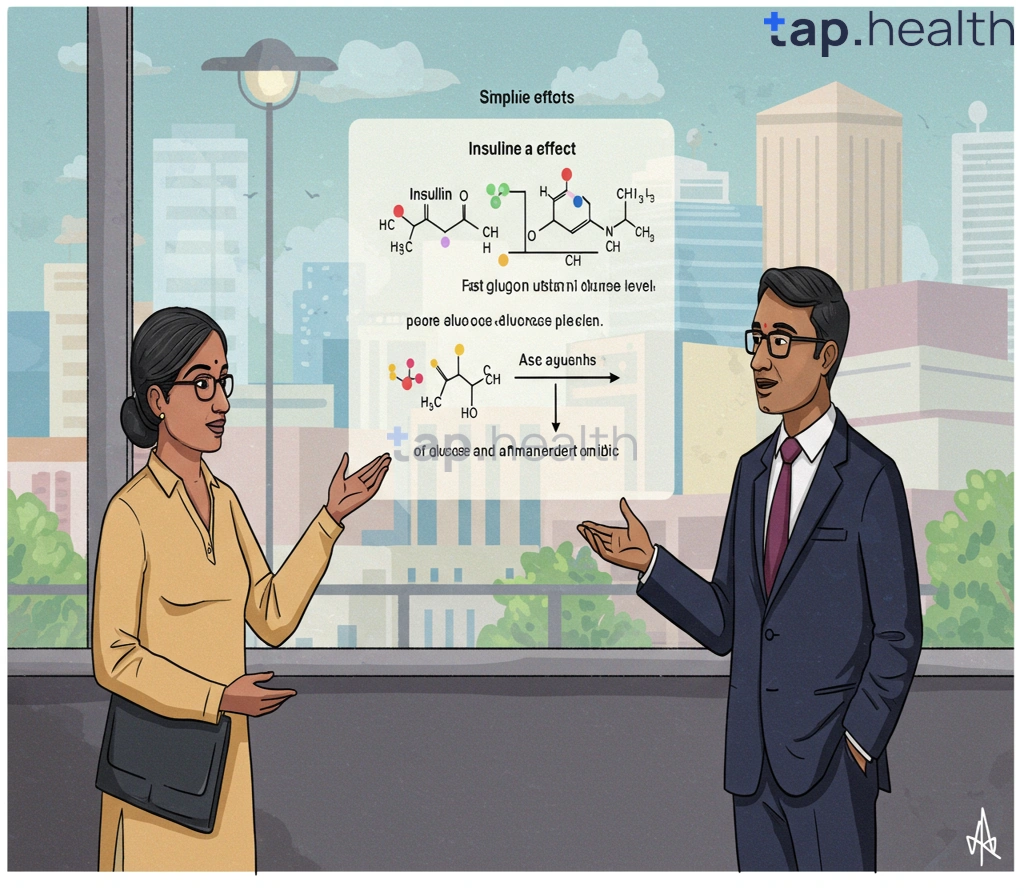Table of Contents
- Fasting Glucagon & Glucose: Insulin’s Role in Non-Diabetics
- How Insulin Regulates Blood Sugar & Glucagon Levels
- Understanding Insulin’s Impact on Glucose Metabolism
- Insulin, Glucagon, and Glucose: A Comprehensive Guide for Non-Diabetics
- Optimize Glucose Metabolism: Insulin’s Crucial Role
- Frequently Asked Questions
- References
Ever wondered how your body manages blood sugar levels when you’re not eating? It’s a fascinating interplay of hormones, and understanding it can be key to maintaining optimal health. This blog post dives into Insulin’s Impact on Fasting Glucagon & Glucose Metabolism in Non-Diabetic Individuals, exploring the intricate relationship between insulin, glucagon, and your glucose levels during fasting. We’ll unpack the science behind this process in a clear, easy-to-understand way, revealing how even without food intake, your body works tirelessly to keep everything balanced. Get ready to learn how your body’s natural regulatory mechanisms keep you feeling your best!
Fasting Glucagon & Glucose: Insulin’s Role in Non-Diabetics
Understanding the Interplay
Insulin, a crucial hormone produced by the pancreas, plays a vital role in regulating blood sugar levels, even in individuals without diabetes. In the fasting state (typically after 8-12 hours without food), the body relies on a delicate balance between glucose and glucagon to maintain a normal fasting blood sugar level, ideally between 70–99 mg/dL. High levels of fasting glucose can indicate pre-diabetes (100–125 mg/dL) or diabetes (126 mg/dL or higher), highlighting the importance of this hormonal regulation. Insulin’s primary function during fasting is to prevent excessive glucose release from the liver, ensuring stable blood sugar levels. This prevents potentially dangerous hypoglycemia (low blood sugar).
Glucagon’s Counter-Regulatory Role
While insulin works to lower blood glucose, glucagon acts as a counter-regulatory hormone. When blood sugar dips too low during fasting, glucagon signals the liver to release stored glucose (glycogen) back into the bloodstream, preventing hypoglycemia. The interaction between insulin and glucagon ensures a stable glucose supply to the body’s cells, particularly crucial for brain function, even while fasting. This finely tuned hormonal dance is essential for overall metabolic health. Understanding this interplay is key to managing blood sugar effectively, and exploring strategies like Meal Timing & Intermittent Fasting for Glycemic Stability can be beneficial.
Regional Considerations in India and Tropical Countries
In India and other tropical countries, dietary habits and lifestyle factors can significantly impact glucose metabolism. High carbohydrate diets, common in many parts of these regions, can influence insulin sensitivity and potentially lead to higher fasting glucose levels. Regular physical activity and a balanced diet, incorporating whole grains, fruits, and vegetables, are crucial for maintaining healthy blood sugar levels and optimizing insulin function. Regular check-ups with your physician are recommended for early detection and management of potential metabolic issues. Early intervention can significantly improve long-term health outcomes. It’s also important to consider the safety and efficacy of different fasting methods, particularly for those with existing conditions. For example, if you’re considering intermittent fasting, you might find our article on Is Intermittent Fasting Safe for Diabetics? helpful.
How Insulin Regulates Blood Sugar & Glucagon Levels
Insulin, a crucial hormone produced by the pancreas, plays a pivotal role in regulating blood glucose (sugar) levels. Understanding its interaction with glucagon is key, especially considering that over 80% of Type 2 diabetics exhibit insulin resistance, a major underlying factor. In non-diabetic individuals, insulin’s primary function is to facilitate glucose uptake from the bloodstream into cells, primarily muscle, liver, and fat cells, lowering blood glucose levels. This process is vital for energy production and storage.
Insulin’s Impact on Glucagon
Glucagon, another pancreatic hormone, acts as a counter-regulatory hormone to insulin. When blood glucose levels are low, glucagon signals the liver to release stored glucose (glycogen) into the bloodstream, raising blood sugar levels. Insulin’s presence effectively suppresses glucagon secretion. This intricate balance between insulin and glucagon maintains glucose homeostasis, preventing both hypoglycemia (low blood sugar) and hyperglycemia (high blood sugar). In conditions like insulin resistance, this balance is disrupted, leading to elevated blood glucose levels.
Regional Considerations in Tropical and Indian Countries
In regions like India and other tropical countries, dietary habits often contribute to insulin resistance and related metabolic disorders. High carbohydrate diets, particularly those rich in refined carbohydrates, can lead to insulin spikes and subsequent drops, further exacerbating the imbalance between insulin and glucagon. Adopting a balanced diet with controlled carbohydrate intake, incorporating regular physical activity, and managing stress are crucial steps towards maintaining healthy insulin and glucagon levels. For more information on how to improve insulin sensitivity through diet and exercise, check out our article: How to Improve Insulin Sensitivity with Diet and Exercise. Consulting with a healthcare professional for personalized advice is recommended, especially if you have a family history of diabetes or experience symptoms like excessive thirst or frequent urination. Early intervention is key to preventing the development of insulin resistance and its associated complications. It’s also important to understand how insulin can affect other organs, such as the kidneys. Learn more in our article: Does Insulin Affect Kidneys?
Understanding Insulin’s Impact on Glucose Metabolism
Insulin’s Role in Glucose Regulation
Insulin, a crucial hormone produced by the pancreas, plays a pivotal role in regulating blood sugar levels. After we eat, our blood glucose rises. In response, the pancreas releases insulin, which acts like a key, unlocking cells to allow glucose to enter and be used for energy. This process is vital for maintaining healthy blood sugar levels. Without sufficient insulin, glucose accumulates in the bloodstream, leading to hyperglycemia, a hallmark of diabetes. This is particularly relevant in regions like India and other tropical countries where diets often include high levels of carbohydrates.
Fasting Glucagon and Glucose Metabolism
During fasting, the body’s glucose supply decreases. To maintain blood glucose levels, the pancreas releases glucagon, another hormone that triggers the liver to release stored glucose into the bloodstream. Insulin’s role during fasting is to counterbalance this process, preventing excessive glucose release and maintaining a stable blood sugar level. Imbalances in this system can have serious consequences. The increasing per capita sugar consumption in India, currently at 20 kg/year, significantly increases the risk of developing diabetes by 18%, highlighting the importance of understanding insulin’s role in glucose metabolism. This underscores the need for mindful dietary choices in regions with high rates of carbohydrate consumption.
Practical Implications for Indian & Tropical Populations
Maintaining a balanced diet low in refined sugars and carbohydrates is crucial for optimal insulin function and glucose homeostasis. Regular exercise and weight management are also essential aspects of managing blood sugar levels effectively. Considering the high rate of diabetes in India and other tropical countries, understanding how insulin impacts glucose metabolism is paramount for preventive healthcare. For more information on how specific food choices impact insulin response, you might find our article on Dairy and Alternatives: Understanding Their Impact on Insulin Response helpful. The impact of processed foods is also significant; learn more in our article on Effects of Ultra-Processed Foods on Insulin Resistance. Consult a healthcare professional for personalized advice on managing your blood sugar levels and mitigating your risk of developing diabetes.
Insulin, Glucagon, and Glucose: A Comprehensive Guide for Non-Diabetics
Understanding how insulin, glucagon, and glucose interact is crucial for maintaining optimal health, especially in regions like India and other tropical countries where dietary habits significantly impact metabolic processes. These hormones are key players in regulating blood sugar levels. Insulin, released after eating, helps your cells absorb glucose from the bloodstream, preventing high blood sugar. Glucagon, on the other hand, acts as a counter-regulatory hormone, raising blood glucose levels when they fall too low, ensuring a stable energy supply.
Fasting and Hormone Balance
During fasting, insulin levels naturally decrease, allowing glucagon to stimulate the release of stored glucose (glycogen) from the liver, maintaining blood sugar within a healthy range. This intricate dance between insulin and glucagon is essential for energy homeostasis. However, imbalances can occur due to various factors including diet and lifestyle. For instance, consistently consuming high carbohydrate meals might lead to insulin resistance in the long run. While 45–60 grams of carbs per meal is a guideline often suggested for managing diabetes, this is highly individualized and depends on factors such as activity levels and metabolic health. In India, for example, traditional diets often contain significant amounts of carbohydrates; understanding this balance is particularly important.
Maintaining Metabolic Health
Maintaining a healthy weight, regular exercise, and a balanced diet are crucial for optimal insulin and glucagon function. In tropical climates, where access to fresh produce might be easier, focusing on a diet rich in fruits, vegetables, and lean protein can help support balanced blood sugar levels. Prioritizing whole grains over refined carbohydrates can also assist with glucose management.
Actionable Steps for Non-Diabetics in India and Tropical Regions
Consulting a healthcare professional or registered dietitian for personalized dietary advice tailored to your needs and local food availability is recommended. They can help you develop a sustainable eating plan that promotes healthy insulin and glucagon function, keeping your blood sugar levels stable and preventing long-term health issues. Remember that healthy lifestyle choices are key to preventing metabolic complications. For more information on specific conditions, you might find our article on What is Non-Insulin Dependent Diabetes? helpful. Understanding the nuances of insulin can be complex, and if you’re curious about insulin use outside of diabetic management, you might find our piece on How Much Insulin Can a Non-Diabetic Take? informative.
Optimize Glucose Metabolism: Insulin’s Crucial Role
Understanding Insulin’s Influence on Fasting Glucose and Glucagon
Insulin, a vital hormone, plays a crucial role in regulating blood glucose levels, particularly during fasting. In non-diabetic individuals, its primary function is to prevent excessive glucose release from the liver, thus maintaining stable blood sugar levels. This is achieved by suppressing the production of glucagon, a hormone that stimulates glucose release. A delicate balance between insulin and glucagon is essential for healthy glucose metabolism. Disruptions in this balance can lead to metabolic disorders, highlighting the importance of understanding insulin’s intricate role. The impact of this balance is particularly relevant in regions like India and other tropical countries, where dietary habits and lifestyle factors can significantly influence glucose homeostasis.
Insulin Resistance and its Implications in Tropical Climates
Factors such as dietary patterns rich in carbohydrates and refined sugars, coupled with sedentary lifestyles, can contribute to insulin resistance, even in non-diabetic individuals. Insulin resistance, a condition where cells become less responsive to insulin’s effects, impairs glucose uptake and can lead to elevated fasting glucose and glucagon levels. This is further complicated by the prevalence of diabetes in low- and middle-income countries, as highlighted by the fact that over 75% of people with diabetes live in low- and middle-income countries. Understanding these regional disparities is crucial for developing effective preventative strategies and managing glucose metabolism. Improving insulin sensitivity is key, and you might find Effective Anti-Inflammatory Diet Strategies to Boost Insulin Sensitivity helpful.
Practical Steps for Maintaining Healthy Glucose Metabolism
Maintaining a balanced diet that emphasizes whole grains, lean proteins, and healthy fats is crucial. Regular physical activity, even moderate exercise like brisk walking, significantly improves insulin sensitivity. Regular health check-ups, particularly in high-risk populations, are essential for early detection and management of any potential metabolic imbalances. By adopting these lifestyle changes, individuals in India and other tropical countries can optimize their glucose metabolism and mitigate the risks associated with insulin resistance and related metabolic disorders. Incorporating foods like those discussed in Discover How Fermented Foods Help Regulate Blood Glucose Levels can also be beneficial.
Frequently Asked Questions on Glucagon & Glucose Metabolism in Non-Diabetic Individuals
Q1. What are insulin and glucagon, and how do they affect blood sugar?
Insulin and glucagon are hormones from the pancreas that control blood sugar. Insulin helps cells absorb glucose, lowering blood sugar, while glucagon raises blood sugar by releasing stored glucose from the liver. Their balance keeps blood sugar stable.
Q2. How can diet affect insulin sensitivity and blood sugar levels?
Diets high in carbohydrates, especially common in some regions, can reduce insulin sensitivity. This means your body doesn’t respond as well to insulin, potentially leading to higher fasting blood sugar.
Q3. What lifestyle changes can help maintain healthy blood sugar levels?
Maintaining healthy blood sugar involves a balanced diet, regular exercise, and regular check-ups with a doctor. These habits are especially important for people at higher risk of metabolic problems.
Q4. Why are regular health check-ups important for blood sugar management?
Regular check-ups allow for early detection of metabolic imbalances. Early detection is key to preventing long-term health issues associated with unstable blood sugar.
Q5. What are the potential long-term consequences of poorly managed blood sugar?
Poorly managed blood sugar can lead to various long-term health problems. Early detection and management through lifestyle changes and medical care are crucial to mitigating these risks.
References
- Learning demands of diabetes self-management: a qualitative study with people who use insulin: https://www.scielo.br/j/rlae/a/x3YzdP55MFxtHWP7qjMVQcP/?format=pdf&lang=en
- Blood Glucose Level Prediction in Type 1 Diabetes Using Machine Learning: https://arxiv.org/pdf/2502.00065




